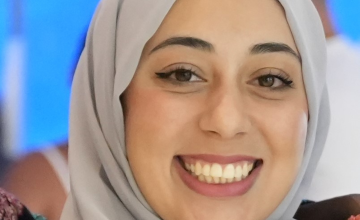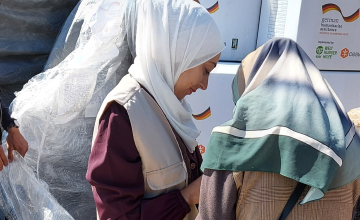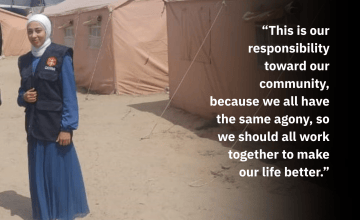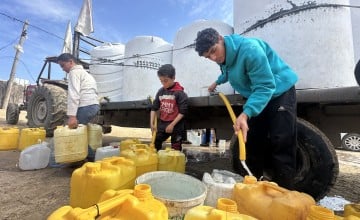
Read our 2024 annual report

Knowledge Hub
As we approach the two year anniversary of the eruption in conflict, the humanitarian crisis in the Gaza Strip is catastrophic.
According to the IPC Alert issued on July 29th, “the worst case scenario of famine” is playing out in the Gaza Strip. Hunger-related deaths have sharply increased due to widespread starvation, severe malnutrition, and the rapid spread of disease due to destroyed hygiene and sanitation systems and crowded living conditions. Meanwhile, current food aid efforts are insufficient, and the civilian population now has to choose between risking their lives trying to access food aid for their family or face slow starvation.
It can be hard to grasp the full horror of the situation unfolding in Gaza. Concern Worldwide is supporting our Alliance2015 partners CESVI who are on the ground in Gaza, distributing vital aid like clean water to affected communities. One of CESVI’s staff working tirelessly in the Strip is Nour Khalifa, accountability and referrals officer. Living in Gaza, Nour is also personally affected by the devastation around her, all while upholding her humanitarian principles and values to provide aid to those who need it most.
Ahead of World Humanitarian Day on August 19th, we spoke to Nour about her role at CESVI, the situation she sees daily in Gaza, and what motivates her to keep going in times of great difficulty.

“Before joining CESVI in February this year, I was already working in the humanitarian field for many years. This was my passion in my life, to be specialised in this sector. Over the past two years, the situation in Gaza has changed totally, and the vulnerability of orphans, widows and other types of people has increased. My role is to ensure the transparency and accountability of CESVI’s activities, and safeguarding for children and all the beneficiaries that we are targeting in Gaza Strip.
“The situation is totally different than before. It’s very risky for everyone, whether we’re talking about the workers, or the civilians themselves. Sometimes I'm a worker and sometimes also a civilian. So it's very risky if I want to go out, whether for a personal purpose or for work. It's become more tiring and full of challenges.
“Before, we had transportation, we had food, our health was better, but nowadays we face a lot. If I want to go to my office, I have to walk, because transportation is rare and it doesn’t go everywhere. We don't have electricity so we depend on solar panels as a source of electricity, which is not available everywhere. Previously, everyone had an internet connection in their home, so if there was any emergency situation, we could handle our work at home. It was not a big deal. But nowadays you cannot do your work at home. You have to go find a place to have electricity and internet.

“My duty is to be involved with the beneficiaries, to hear their complaints or concerns. Once they know that I'm a humanitarian aid worker, they will start talking about many, many things. Sometimes people come and ask you for food or any other kind of aid, which I sometimes cannot afford myself. I'm a humanitarian worker. My duty is to provide you with the service that you need. But when you feel that you're failing in giving them what they need, you will feel frustrated. So what can I say? This is the issue that I'm facing daily. Of course I try to explain to them, but I can't do anything which also increases the burden in my heart.”
Losing basic needs
“The Maslow pyramid of basic needs has shelter, food, water - things that the people in Gaza nowadays are unfortunately missing. People became displaced, most people here lost their houses. They started to live in their tents or makeshift shelters or in schools, universities, governmental buildings, and they are living together without having any privacy, without having any hygienic situation, because the infrastructure of Gaza became totally destroyed.
“You will find that a lot of families, maybe 20 families, are sharing one bathroom. This was not the situation of people before the conflict. They need shelter that helps them to live with dignity, with a little bit of privacy.
When trucks come to any neighbourhood, you see how much people hurry and start to run just to fill one jerry can, or two if they are lucky.
“They are also in need of water, whether we’re talking about drinking water or the domestic water. Nowadays people are depending on the water trucks that are coming. When trucks come to any neighbourhood, you see how much people hurry and start to run just to fill one jerry can, or two if they are lucky. There is a huge shortage of domestic water to clean their houses and clothes and to wash with, and sometimes it's not reaching people. This is affecting the life of people too because they are not able to practice the hygienic routines that they were doing before. Most mothers are not able to bathe their children every day. Some families may not be able to clean the latrines because of the shortage of water... it will cause a lot of diseases.
“The most basic need is the food and the flour. Some countries may depend on rice, pasta, etc, but here, flour is the basic item for all meals. So once the families don't have access to this, they will start starving. We are talking about two years of closure of corridors. Most nutritional foods were not entering. It has affected their health. The people nowadays are very pale. They became skinny. They don't have any health. They need access to good food.”
"People feel they are losing their dreams"
“Of course, there are many other needs. Students are deprived of their education. We're talking about two years of not going to school. There are students who finished their bachelor's degree, and they are trying to get a master's degree, or to get a scholarship outside, and they cannot go out.
“Now it’s about two years that children cannot go to school, which is catastrophic because here in Gaza, people are very keen about educating their children. We have this philosophy to be educated and to educate our children. It's not like luxury or anything. This is a basic for everyone to be educated.
“For example, my nephews and my nieces were excellent students, but they are not able to go to school nowadays. We tried make our children to join the temporary schools, but the problem was that you cannot guarantee that your children will be safe to go to schools because any rocket, any missile could target any place where they are coming out.
“Of course, maybe people nowadays are not focusing too much on education because they are very busy with trying to provide their families with food and water. But it's still a concern inside their heart that they are worried about. These people feel that they are losing their dreams, their ambitions and their plans for the future.”
How conflict is affecting communities
“One of the things that had an impact on me is that I started to witness the change in people’s psychological behaviour here. Once you deprive people of food, water, flour, once you deprive them of their homes and of good shelter, they are not having a dignified life. So of course the behaviour of people will change.
“I notice that gender-based violence has increased. Once the man fails to provide his family with what they need, if he has lost his job, he's lost his property, etc. his actions may change and he may start to be violent against his wife, sister, sometimes maybe his daughters.
“It has also affected the behaviour of children. I see this in my own eyes. When they have fights, they carry stones and they throw them at each other. The verbal language they use has changed. I know that this happened because they started to live closely next to each other. The people lost their privacy. They hear a lot of words, so they will start to repeat these words even if they don't understand them.
“The aid nowadays, when it enters Gaza is not reaching everyone. So what is happening is that people started to loot the aid. The one who is looting this aid, he will survive because he will be able to feed his family. There are a lot of women; they don't have husbands because they were killed, or their husbands might have disabilities, or they might be injured. They have children, and they don't have anything to feed their children. So they find themselves forced to go to these areas. The problem was that the trucks were arriving after midnight. So they were going to that area, which is very, very crowded with a lot of men. So just imagine what the situation is for the woman who was going there. She may not get anything because she can’t get past the crowds.”

"It's my duty"
“I'm one of the people who are living in Gaza. I'm not only a humanitarian, I'm also a person who's affected badly by this situation, but still it's my duty and responsibility to help the people have a dignified life, to make their voices heard, to ensure that they have adequate services, to safeguard the children while they are trying to get the services.
“This is our responsibility toward our community, because we all have the same agony, so we should all work together to make our life better.
“What we are doing is that we are working as much as we can just to make our life a little bit better, just to give them a little bit of hope that tomorrow might be better.”
CESVI's vital work in Gaza

“We are providing a life-saving service - water trucking - because water is the basic need to keep our people alive. We are also working on the rehabilitation at the IDP shelters. We're trying to make the shelters at the site more hygienic because the situation has deteriorated. We are also providing some sites with latrines because there is a huge shortage of latrines.
“To take care of vulnerable people, we start off making a needs assessment for the sites we are targeting, we are giving high priorities to the sites which include a huge number of the female-headed families and people with disabilities.
“Many people are sheltering in schools, but these schools don't have an adequate number of toilets or bathrooms. So what the people started to do, they started to make private bathrooms inside the room where they are living. But the problem is that these bathrooms are not linked to a sewage network. So what was happening is that the hygienic situation of the shelter was very bad. We're not talking only about the bad smell of the shelter, we're also talking about the side effects of this on the people who we help. So we started to rehabilitate these sites, to make it more hygienic.”
When you make a donation to Concern’s Gaza Crisis Appeal, it is going to our partners CESVI, to help them provide water trucking every day, and rehabilitate hygiene and sanitation services to prevent the spread of disease and illness. So far, over 100,000 people have received water through Concern’s interventions with CESVI, while a reverse osmosis machine provided by CESVI and Concern to the last remaining operational children’s hospital in northern Gaza is ensuring that 13 dialysis machines can continue running.





